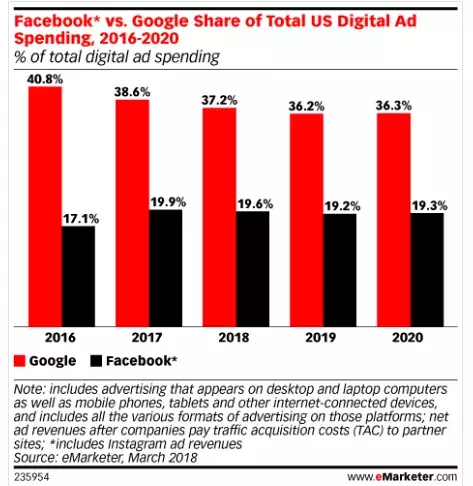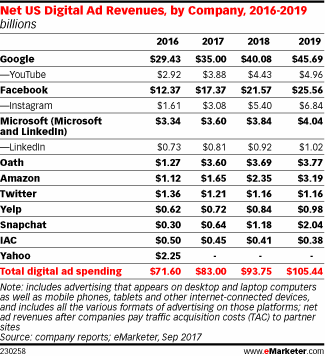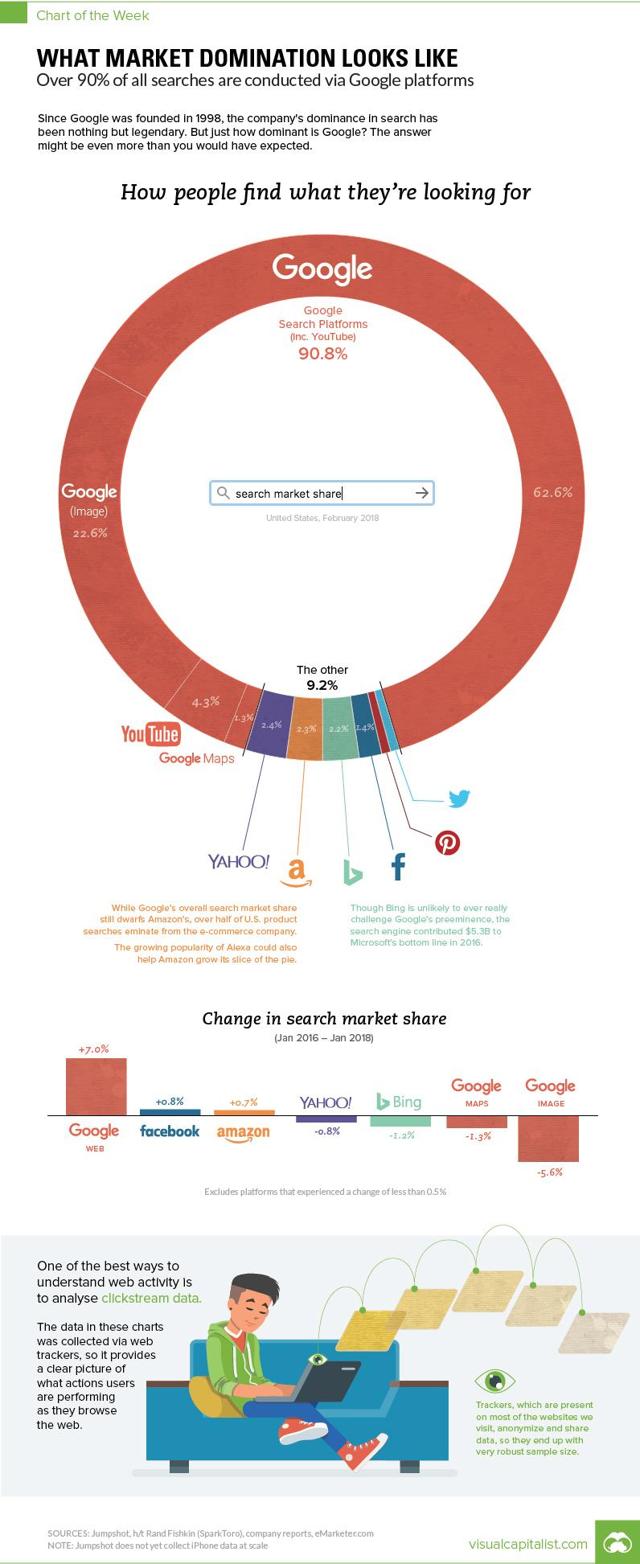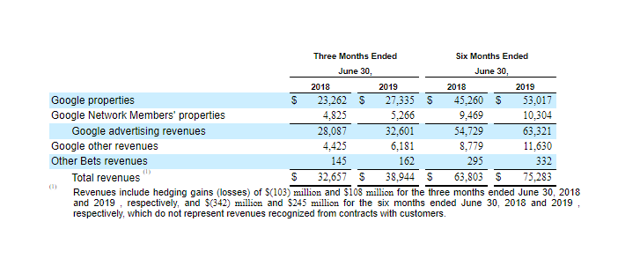Sourced from Seeking Alpha
Google’s grip on the search market is near complete. However, from far outfield there’s surprising competition emerging.
Ecosia is a search alternative running mostly on Microsoft’s Bing. But it’s not competing by offering better search.
Ecosia is taking on Google not by offering better search, but by offering enhanced privacy and social investing.
Recent circumstances have brought these benefits to a much wider audience and growth of Ecosia has taken off as a result.
While Goole’s (GOOG) (NASDAQ:GOOGL) search engine has a seemingly iron grip on the search market and ad income from search constitutes more than 86% of Google’s revenue, competition is emerging from a surprising corner of the market.
Google search business could suffer from the rising popularity of an alternative search engine called Ecosia, a browser mostly powered by Microsoft’s (MSFT) bing engine. The popularity of Ecosia has gotten a very big boost recently, and we’ll discuss why.
Ad dominance
Googleand to a lesser extent Facebook (FB) are dominating the digital ad market, and this is easy to show in one graph, from Investopedia:
 Here are US figures, from eMarketeer:
Here are US figures, from eMarketeer:

The dominance of Google and Facebook in the digital ad market is waning just a little bit lately, as companies like Amazon (AMZN) Twitter (TWTR), Snap (SNAP) and Pinterest (PINS) are growing fast. There shouldn’t be any doubt about Google’s continued dominance. It will take a long time for these relative newcomers to catch up.
Search dominance
Google’s dominance in search is even bigger compared to digital ads. Once again from Visualcapitalist:
It’s so dominant that to google has become a verb and synonymous with search. One would never imagine Google being unseated in the search market, as big competitors like Microsoft (MSFT), Yahoo and others weren’t able to make a dent.
What’s more, search runs on algorithms, which need big data, which creates a situation that the largest companies are at an advantage.
Google derives most of its revenue from search (in the order of 86%). Any inroads here will have very serious implications for its finances. From the Q2 10-Q:
Ecosia
Ecosia is a Berlin, Germany,-based company that launched 10 years ago, founded by Christian Kroll. It’s taking on Google, but not because it’s a better search engine, instead it provides two unique angles in the competitive battle:
- Privacy
- Social benefits
On the first, from Wikipedia:
Searches are encrypted, not stored permanently, and data is not sold to third-party advertisers. The company states in their privacy policy that they do not create personal profiles based on search history, nor do they use external tracking tools like Google Analytics.
Management recently clashed with Google, accusing it of anti-competitive behavior (EU-startups):
Ecosia today confirms that it has declined to take part in Google’s recently-announced auction for the right to be a “default” search engine on Android. Ecosia calls upon Google to abandon this unethical practice and allow users to freely choose which search engine they use, rather than auctioning off access to the highest bidder. Ecosia is the first search engine decided to reject Google’s “invitation” to this anti-competitive auction and calls other search engines to join.
On the second, the company spends 80% of its search ad profits to planting trees. Here are some data on that:
- Every search request removes 1kg of CO2 from the atmosphere.
- It takes roughly 45 searches to plant one tree as Ecosia earns about 0.5 eurocents per search and it cost 22 eurocents to plant a tree.
- While Ecosia is a for-profit business (albeit a social one), the founder cannot sell and profits cannot be taken out of the company.
- By February this year, the company had planted 50M trees.
The search engine is actually powered by Microsoft’s bing (enhanced with their own algorithms running on servers powered by alternative energy). It earns money on search ads. It also earns money on some merchandise and the profits on these also go mostly to planting trees. So if it sells a t-shirt, that’s 20 trees planted (according to their FAQs).
The social aspect has important competitive benefits, from Browsermedia (our emphasis):
Nielsen carried out an online study and asked 30,000 digital consumers what they thought about the products they buy, and what they’re prepared to pay for a sustainable product. Sixty-six percent of people asked said they were prepared to pay more for a product sold by a company who is environmentally aware and committed to sustainability.
In fact, by using Ecosia, you don’t even have pay more (search is free). Quite the contrary, you get much better privacy protection in the process so you don’t “pay” by surrendering private data either.
Growth
One might infer that the use of the browser is likely to get a boost from the recent fires in the Amazon as it’s an easy way for people who are concerned and feel helpless to do something.
One can add to this recent insight that tree planting is by far the most viable and cheapest way to combat climate change. Does this expectation pan out?
In 2017, it was still tiny (Browsermedia):
Ecosia boasts over 5.5 million active users, and receives on average 56 queries per second. Google, in contrast, has over 1.17 billion users, and receives over 40,000 queries every second.
As it turns out, there’s indeed a recent big boost, from Bigthink (our emphasis):
But last week did yield some good news for the Brazilian Amazon: Ecosia, a search engine that donates some of its profits to tree-planting projects, saw a 1150% increase in downloads on Thursday as more people become aware of the fires, becoming the top-ranked iOS app in Brazil.
And here is Businessinsider with more details:
CEO Christian Kroll told Business Insider that the non-profit usually sees 20,000 daily downloads on average, but that shot up 1150% to 250,000 on 22 August, as media coverage around the Amazon fires intensified.
A quarter of a million downloads in a single day, that adds up. Not to put a pun on it, but this could spread like wildfire (Bigthink, our emphasis):
Users voicing their concern on social media is partly responsible for the uptick in Ecosia’s downloads. Business Insider found Instagram users encouraging their friends to download the app in response to the rainforest fires, and the app is prominently mentioned by users on Twitter alongside the #PrayforAmazonia hashtag.
So this is clearly spreading socially with the passion generated by the fires and what many see as an inadequate reaction spurring people to downloading Ecosia.
Wider implications
We also think there’s a competitive lesson that has potentially much wider implications. There’s a substantial market for products and services that, as long as they are “good enough” on their basic function (like Bing in search) might be able to take on much more capitalized competitors by embracing social goals.
In fact, they could even charge premium prices for doing so, as we showed research above that suggested that a substantial part of consumers are willing to pay higher prices for companies to embrace social goals.
It won’t work in every market, but this search example shows that not even the most dominant, entrenched companies are entirely immune from these forces.
In fact, as search is free so any competitor competing on social goals like Ecosia doesn’t have to charge premium prices, Google might be one of the more vulnerable companies to this competitive threat.
Conclusion
Google’s dominance in search seems near absolute, but Ecosia using an innovative business model that addresses important privacy claims and devotes 80% of its search ad profits to planting trees might be well positioned to make serious inroads.
It’s dangerous for Google simply because of the unique cocktail of low switching costs, high passions (produced by the Amazon fires and the Brazilian President’s reaction) and the impotence of alternative meaningful actions for those worried about the Amazon.
Add to that recent reports that identified tree planting as by far the cheapest way to combat climate change, and you could very well have a winning formula with Ecosia.
Since Ecosia is largely running on Microsoft’s bing, the latter too will get a significant boost from Ecosia’s growth, which might be something for investors to consider, although search is only a very small part of Microsoft’s revenue.
Disclosure: I/we have no positions in any stocks mentioned, and no plans to initiate any positions within the next 72 hours. I wrote this article myself, and it expresses my own opinions. I am not receiving compensation for it (other than from Seeking Alpha). I have no business relationship with any company whose stock is mentioned in this article.



